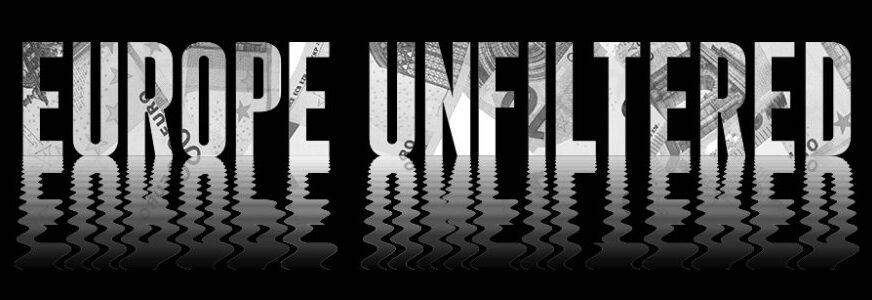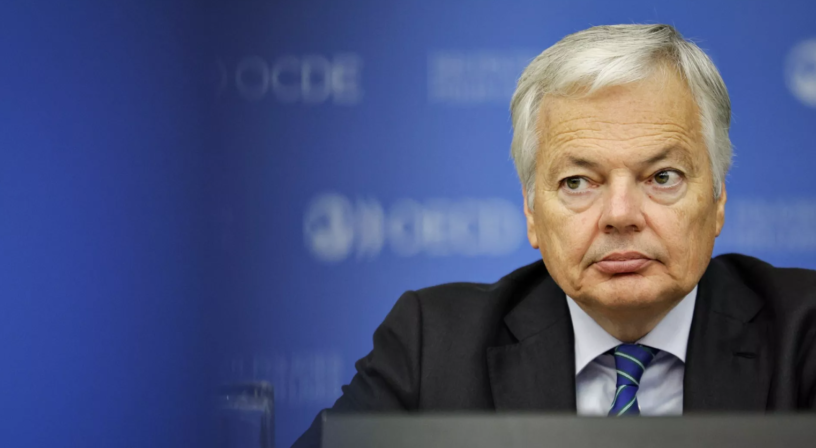“We face a systemic problem rather than isolated violations of European Law.”
Probably Didier Reynders himself didn’t think that this statement would backfire at him.
Or rather, he had probably hoped that it would not, hoping that his various high-ranking positions would defend him from the power of the very same law he claimed to protect so vocally against the (supposed) violations on the side of Poland or Hungary.
After all, he already got away once, in 2019.
Back then, he was also accused of corruption and money-laundering related to the construction of the Belgian embassy building in Kinshasa (Congo) and the lease of a federal police HQ, among others, including bribery by arms dealers and accepting bribe from a Congolese election candidate.
The whistleblower (a former Belgian intelligence officer) gave detailed account on how Reynders sold low value paintings and antiques at inflated prices to launder the money, along with a series of fraudulent property transactions and shell companies.
In the end, Belgian prosecutors dropped the case for lack of evidence.
Well, the truth to be told, Reynders got away more than once.
The above-mentioned issue was different only because it resulted at least in one, albeit short, investigation.
For about 20 years, Reynders worked in close cooperation with Jean-Claude Fontinoy.
The two met while both were working at the national railways (SNCB).
From that moment on, wherever Reynders went, Fontinoy followed him. Or as the saying in Wallonia goes, “Fontinoy se scotche à Reynders”, lit. Fontinoy sticks to Reynders.
By the way, Fontinoy was also accused of being an accomplice in Reynders’ activities in Congo, acting as a go-between Reynders, the Congolese President and the Belgian-Lithuanian company Semlex, the latter producing biometric passports at about twice the price of the competitors.
Journalist Philippe Engels’ 2021 book, “The Reynders Clan” gave a detailed account on this relationship, a harrowing description of the growing collusion between business and politics.
Something well known by Reynders himself, too, given that in 1999, he held parallel jobs as Minister of Finance and member of the board of directors of the Carmeuse Coordination Centre, a lime production company owned by the Collinet family.
Back then, such centres benefited from a hyper-advantageous tax regime, something the EU tried put an end to. Thus, Reynders fought for those in his dual role against the very same institution he joined a couple of years later.
All through his tenure as minister of finance, he was known to be “the minister of the rich” and the official who simply signed the laws (and made sure parliament voted them) that were written by the beneficiaries of such laws and government actions, let it be from saving diamond traders involved in murky businesses or saving the Fortis Bank (selling it on a bargain price to BNP Paribas).
It was surely just a lucky coincidence, that Reynders’ long-time friend, Albert Frère happened to be a financial partner of the French banking group for almost half a century and has aggressively lobbied for the deal. Or that Reynders himself was on friendly relations with former French president Nicholas Sarkozy.
While Engels’ book didn’t accuse Reynders with having taken explicitly illegal actions, it did point at secret meetings, backroom deals, and a handful of privileged private companies belonging to a few influential business players.
Those acts all made the Belgian state poorer while enriched Reynders’ right-hand man and a few select Belgian families. (And possibly Reynders himself.)
Some of those acts were purely unethical.
Others, like paying to the SNCB railway workers to distribute leaflets during the 2014 federal elections, were bordering illegal.
Fontinoy was considered to be the real estate “expert” at the Foreign Affairs Cabinet – not his only job, though. He was also head of the SNCB and other public financial companies.
That, on the other hand casts a permanent shadow of insider trading on Reynders himself.
Especially given his previous role at the national railway and the rumours of “his first million” originating from shady real estate deals (buying cheap properties around future railway developments and selling those at exorbitant prices to the state later).
Thus, Reynders has quite a few skeletons in his closet, no matter which door you open.
From the FortisGate through employing his friend’s daughter Alexia Bertrand as his chief of staff while she also held a position in the board of directors of AvH, her family’s powerful company to the infamous Kazakhgate.
The latter is amongst the most telling examples of his lax interpretation of the rule of law (besides pointing at the close cooperation between Sarkozy, Reynders and Fontinoy again). In 2011, the Belgian parliament adopted a law that basically allowed high-profile criminals to “buy themselves out” from criminal proceedings.
Again, it must had been a coincidence that three Kazakh businessmen (Patokh Chodiev, Alexandre Machkevitch and Alijan Ibragimov, all close billionaire friends of Kazakh President Nursultan Nazarbayev) could make use of that modification and paid their way out of their troubles with the Belgian justice system. Also coincidentally, France and Kazakhstan signed a lucrative Eurocopter deal just 10 days after the Kazakh businessmen walked free.
Reynders’ friends could always rest assured that their interests would be represented accordingly, no matter whether they needed a tax treaty between Belgium and the Seychelles or “deepened ties in all areas, particularly in the area of trade and investment” with Panama, like the Deme company (belonging to Reynders’ friends, the Bertrand family) did.
The list doesn’t stop here.
Neither does the list of Mr. Fortinoy’s own actions of questionable legality – all hanging like the sword of Damocles above his head, and with that, above Reynders’ head, as the names are recurring in each deal, most centred around Fontinoy’s position at the SNBC, his considerable real estate portfolio or his various other companies and organizations, first and foremost the NGO “Les plus beaux villages de Wallonie”.
Supposedly tasked with promoting a number of rural municipalities – and allegedly acting as a money laundering vehicle for the Fontinoy-Reynders duo. It also happens to have a few heavy-weight sponsors like billionaire businessman Marnix Galle’s Immobel group.
Such “minor incidents” as the “blackface scandal” in 2015 (Reynders had his face painted completely black at the Noirauds festival in Brussels and earned himself a heck of criticism for being racist) or visiting Saudi Arabia’s diplomat-slash-drug-dealer prince Nayef bin Fawwaz Al Sha’lan (sentenced to jail in France for transporting drugs using his private Boing 727) were just drops in the ocean.
Voting for Saudi Arabia’s membership in the UN Commission on the Status of Women in 2017? Maybe Reynders believed that participating in the work of this institution would positively influence the views of one of the most oppressive regimes.
Yet, somehow, Reynders always managed to stay afloat, even if others (like Prime Minister Yves Leterme after the FortisGate scandal) lost their positions. He held one or another ministerial portfolio without interruption from 1999 to 2019, surviving several of his bosses.
A lawyer by profession, he has mastered the art of navigating the murky waters of conflicts of interests. No wonder that he earned the name “Teflon Didier” for his ability to escape any drama without too much fuss. He is also called the “smoothest eel of Belgian politics” for the exact same reason.
This latest investigation has been going on for months, but investigators waited until the end of his term at the European Commission, which also marked the end of his European immunity. Since then, his homes in Uccle (Brussels-Capital Region) and Vissoul (Liège) were searched and he was also questioned by the police. Authorities found thousands of euros in cash during the searches.
According to the authorities, Reynders bought lottery tickets through the National Lottery, an organisation he was responsible for as minister between 2007 and 2011, then transferred the laundered profits to his private account.
Both the National Lottery and Belgium’s Financial Information Processing Unit issued statements identifying high bets from Didier Reynders and his entourage in games of chance. He is suspected of having bought “e-tickets”, vouchers with values between 1 and 100 euros at various points of sale, in part in cash.
A common money laundering method.
The exact amount is a mystery, but word spreads about a million of euros, of which 200,000 have been played in recent years. Prosecutors claim the origins of the money are opaque, at best.
Naturally, Didier Reynders is presumed innocent until proven guilty thanks to the most basic principles of criminal law and he was given a chance to prove the legal origins of his wealth.
If that wouldn’t help, an EU anti-money laundering law has been passed recently.
The law that was drafted during Reynders’ mandate coincidentally contains an explicit carveout for national lotteries, identifying those as lower risk activities, hence exempting them of the need of identity checks.
Whether Reynders will be prosecuted or not in the end depends on many things.
First and foremost, it might depend on the Belgian parliament as he (supposedly) committed these acts as a federal minister.
The reaction from the various European institutions was that of denial.
Ursula von der Leyen had no prior knowledge of the investigation. Supposedly. Neither had the Commission opened its own inquiry into the matter.
Renew Europe stated that it would not comment on an ongoing investigation.
Didier Reynders’ career is probably over. He failed to secure positions at the Council of Europe and was not reappointed as Belgian commissioner, either.
But it is of secondary importance.
What really matters is that as European Commissioner for Justice during the tenure of the previous von der Leyen Commission, Didier Reynders had the task of checking whether EU member states complied with European legislation. He was also responsible for ensuring that politicians did not intervene in the administration of justice.
To put it shortly, he was the European champion of rule of law. One can’t help but wonder about the optics of the situation.
If the very same institution that claims to protect the rule of law is headed by a person who has a complete disregard for it, then whom is the average citizen to trust? Who and how can ensure that decisions taken in the name of the rule of law were not motivated by other, less noble goals?
The damage done to the image and credibility of the European Commission can probably be repaired only with years of hard work and only if a thorough investigation is conducted into Reynders’ conduct as commissioner.
If Reynders felt no moral (or legal) restrictions in his private life (as much as a high-ranking politician has one), what is the guarantee that he exercised restraint in office? Either as Justice Commissioner or later, as the EU’s competition chief? What about his closest affiliates? Aides and staff? It should be answered, whether there were decisions by Reynders or the Commission as a whole, that might have been influenced by illicit money flowing to one of the Commissioners. So should be the question, whether Reynders’s team – members of which currently aid Michael McGrath – had knowledge of Reynders’ conduct.
The sheer number of accusations against him is a proof that he always walked on the fine line between legal and illegal, ethical and unethical, at best – probably crossing over to the Dark Side here or there, at worst.

